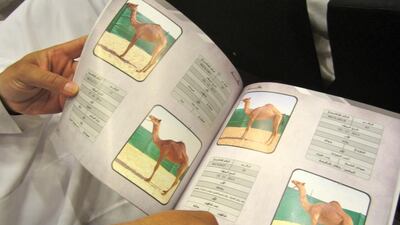It was not just the next generation of race camels on display at last week’s camel auction.
Children sat in the stands, bidding away thousands on camels paraded before the VVIP section. Young men smoked dokha in the stands.
For some children, camels teach caregiving and maturity.
For others, camels are a chance to spend father’s money.
The stands were full of young men bidding on behalf of their fathers.
Would my father and mother have ever trusted me to bid tens of thousands on their behalf? My parents did not trust me with more than a five-cent-a-week allowance. At the age of these boys, my mother hired me out as a Dh10-an-hour babysitter, negotiating a lower rate than family friends offered.
“Wash the dishes, too,” my mother told me. “Clean when the kids go to bed. Earn your keep.”
While my parents prepared me for the realities of low-wage grunt work, these boys are traders in training and a cutthroat bidding strategy is considered a step towards entrepreneurship.
“Now the second generation are taking over the hobbies,” a bidder named Abdulla told me. “It’s not only a hobby. Now it’s commercial. For most, it’s not their money, it’s their parents money and some generate good money from the camel. Some take the risk.”
By pure chance, I sat behind a boy of about 12 who I’d met a week earlier. Initially, I thought he did not recognised me with my hair down and makeup on because he did not acknowledge my hello. But he assured his friend that he did indeed know me and I had been to his farm a week before. He was in no way shy. Just busy. Being a busy businessman.
During a break, I asked the boy his age. He turned to his 11-year-old friend and instructed him to tell me he was “too busy buying camels” to talk to me.
Auctions may teach youth business. Grace and manners are perhaps better learnt at the majlis. He was, after all, very quick to stand for the VIPs.
Snubbed by a child, I was nonetheless received with warmth by the boy’s 42-year-old cousin, Abdullah. Abdullah, the owner of two racers and 15 breeding camels, had attended the auction for five years and finally decided to participate.
“I don’t have a good race camel this year so I seek another another opportunity,” he told me.
Abdullah came with a strict budget and a shortlist of three camels. He planned to buy one.
“This is just entertainment. Once I retired I will be fully dedicated to the camel,” he said.
“How old are you now?” I asked.
“42,” he said.
“When will you retired?,” I asked.
“In 19 years,” he told me.
Abdullah listed the factors to consider when bidding and concluded, “My strategy is to wait a little bit and also I have to watch the others because some are buying on behalf of others so they don’t care about the money. It’s true, sorry.”
Abdullah relied on observation to guess others’ plans.
“They will not tell me. Because, you know in the camel games, there is no transparency. Each one tries to hide what he has planned. But at the end of the day, when you consider all the factors, you have to be lucky if you want to have a camel that’s 1 in 1,000.”
When the camel he wanted appeared, he made his first bid at Dh40,000. A VVIP bidder quickly drove the price to Dh100,000 but Abdullah only dropped out when his boy cousin began to outbid him, eventually purchasing Camel #76 for Dh200,000 on his father’s behalf.
“I didn’t want to bid against him,” Abdullah told me. “He’s my cousin.”
He turned to the boy. “Mabruk, congratulations.”
Then he turned to me. “Relatives. This is one of the factors to consider.”
Although the boy has a farm with many fine camels and knew that Abdullah waited five years to enter the auction, he bid against him a second time later that night.
That is business.

